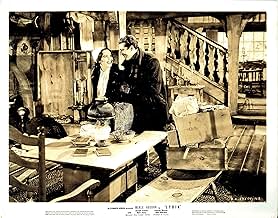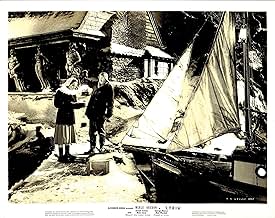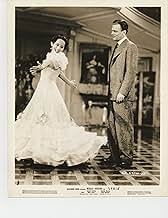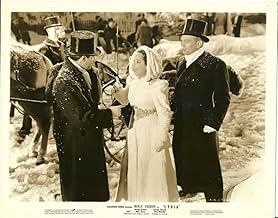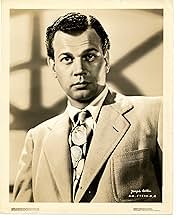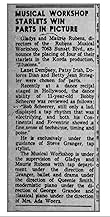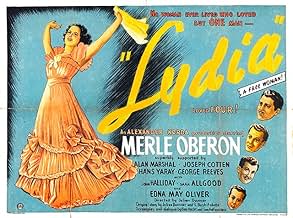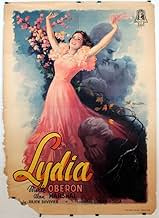Lydia
- 1941
- Tous publics
- 1h 44m
IMDb RATING
6.3/10
969
YOUR RATING
An elderly woman reunites with the three men who loved her in their youth.An elderly woman reunites with the three men who loved her in their youth.An elderly woman reunites with the three men who loved her in their youth.
- Nominated for 1 Oscar
- 5 wins & 1 nomination total
Hans Jaray
- Frank
- (as Hans Yaray)
Evelyn Beresford
- Sarah's Guest
- (uncredited)
Tyler Brooke
- Vaudeville Singer
- (uncredited)
Frank Conlan
- Old Ned
- (uncredited)
Harry Cording
- Hotel House Detective
- (uncredited)
Hal K. Dawson
- Hotel Desk Clerk
- (uncredited)
Jack Deery
- Ball Guest
- (uncredited)
Paul Everton
- Sarah's Guest
- (uncredited)
Jesse Graves
- Michael's Servant
- (uncredited)
Bobbie Hale
- Bar Patron
- (uncredited)
Gertrude Hoffman
- Mrs. Fairfield
- (uncredited)
Featured reviews
An unexceptionable pleasure to the primary senses of the eyes and ears. This results from a combination of Oberon's lush eyebrows and the pillowy opulence one imagines from a director with a surname like Duvivier. The film is a 'refashioning' of his French-language 'Un Carnet De Bal' from 1937, in that the basic plot is Oberon's portmanteau recollection of 4 past loves. Cynics may understandably dive for the sick bags, but it's a pleasant surprise therefore to find that for all the typical Fox emphasis on visual scrumptiousness, this romantic opus turns out to be a narratively literate affair. It's lent considerable dramatic weight by an excellent cast, including an uncharacteristically unhistrionic Oberon.
When the film was finally released in Duvivier's native France ,it did not meet critical favor.I personally find little fault with the opinions expressed."Lydia" is a confused cold work.Duvivier's great American movies are not "Great Waltz" or "Lydia" .They were yet to come:"tales of Manhattan" and "Flesh and fantasy" are immensely superior to the aforementioned efforts.
"Lydia" is supposed to be a remake of "Un Carnet de Bal ",Duvivier's indisputable masterpiece.But the two works are worlds apart.I would go as far as to write "Lydia" is to "Carnet de Bal" what "The long night" is to "Le jour se lève" .But Carné's chef d'oeuvre was remade by Anatole Litvak whereas Duvivier redid himself.
Actually "Lydia" reminds me of Duvivier failed film "Untel Père Et Fils " ;it's a hodgepodge : a grumpy granny with a golden heart, a sailor ,the Civil War(?) , a blind pianist ,the sad fate of blind children during the nineteenth century, the good lady whose life is not empty cause she creates a house for these unfortunate kids (a permanent feature of the French cinema of the era : see also "Le Voile Bleu"-remade as "the blue veil" - and "Péchés de Jeunesse").
Nothing is left from the original work,the Madeleine of Proust of the French cinema: and showing Merle Oberon with her three beaus (and the fourth is not far away)does not make up for Marie Bell's spleen,solitude and nostalgia on the banks of the lake.One should also add that the male characters are not really interesting.
Orson Welles was a great Duvivier fan and it's probably the reason why Joseph Cotten is part of the cast.Later,Welles would borrow the female star of "Au Royaume des Cieux" (Suzanne Cloutier) from Duvivier for his "Othello".
The best of this movie is its pictures:the ball is nicely filmed ,although a bit kitsch;the snowy landscapes are enhanced by a refined cinematography.
The sound of my copy is rather lousy. The music ,which is intrusive,often drowns out the actors' voices.
"Lydia" is supposed to be a remake of "Un Carnet de Bal ",Duvivier's indisputable masterpiece.But the two works are worlds apart.I would go as far as to write "Lydia" is to "Carnet de Bal" what "The long night" is to "Le jour se lève" .But Carné's chef d'oeuvre was remade by Anatole Litvak whereas Duvivier redid himself.
Actually "Lydia" reminds me of Duvivier failed film "Untel Père Et Fils " ;it's a hodgepodge : a grumpy granny with a golden heart, a sailor ,the Civil War(?) , a blind pianist ,the sad fate of blind children during the nineteenth century, the good lady whose life is not empty cause she creates a house for these unfortunate kids (a permanent feature of the French cinema of the era : see also "Le Voile Bleu"-remade as "the blue veil" - and "Péchés de Jeunesse").
Nothing is left from the original work,the Madeleine of Proust of the French cinema: and showing Merle Oberon with her three beaus (and the fourth is not far away)does not make up for Marie Bell's spleen,solitude and nostalgia on the banks of the lake.One should also add that the male characters are not really interesting.
Orson Welles was a great Duvivier fan and it's probably the reason why Joseph Cotten is part of the cast.Later,Welles would borrow the female star of "Au Royaume des Cieux" (Suzanne Cloutier) from Duvivier for his "Othello".
The best of this movie is its pictures:the ball is nicely filmed ,although a bit kitsch;the snowy landscapes are enhanced by a refined cinematography.
The sound of my copy is rather lousy. The music ,which is intrusive,often drowns out the actors' voices.
Here Oberon shines. The story is slight, yet gives Oberon time to revel in the Ben Hecht/Samuel Hoffenstein dialogue. Oberon plays Lydia, a woman who is searching for love. The film is framed by a reunion, with Lydia as an old woman. She is reunited with the four fellows that have chased her throughout her life. All four actors do their best with their roles, but none standout. They mostly just stare longingly at Oberon for the duration of the film. None are given much consideration or motivation other than as a lovers for Oberon can push around.
Other than Oberon, Julien Duvivier, the director, is the real star. His direction makes the most out of the simple plot. Certain scenes stick out more than others. The scene when Michael (Joseph Cotten) and Lydia run into the ball of Lydia's imagination, in slow-motion is very memorable for its dream-like feel. Also, when Frank (Hans Jaray), the blind pianist plays for the blind children, the scene is framed very beautifully. Also Miklos Rozsa's Oscar-nominated score is very good.
A pretty good drama that suffers from a necessary but clumsy framing device with the reunion, as well as a third act that doesn't jell well with the rest of the film.
Other than Oberon, Julien Duvivier, the director, is the real star. His direction makes the most out of the simple plot. Certain scenes stick out more than others. The scene when Michael (Joseph Cotten) and Lydia run into the ball of Lydia's imagination, in slow-motion is very memorable for its dream-like feel. Also, when Frank (Hans Jaray), the blind pianist plays for the blind children, the scene is framed very beautifully. Also Miklos Rozsa's Oscar-nominated score is very good.
A pretty good drama that suffers from a necessary but clumsy framing device with the reunion, as well as a third act that doesn't jell well with the rest of the film.
After dedicating a home for blind and crippled children, doddering old Merle Oberon (as Lydia MacMillan), who never married, attends a surprise gathering of her old boyfriends. The reunion is arranged by physician Joseph Cotten (as Michael Fitzpatrick). The son of Ms. Oberon's family butler, Mr. Cotten has also invited blind musician Hans Jaray (as Frank Andre) and future "Superman" George Reeves (as Bill Willard). A fourth beau, seafaring adventurer Alan Marshal (as Richard Mason) may or may not appear. He is one of the story's mysteries, so stay tuned. Oberon and her old suitors reminisce about their romances, in flashbacks beginning in 1897, when "the prettiest girl in Boston" was a desirable young maiden...
"Lydia" is a re-make of director Julien Duvivier's "Un carnet de bal" (1937), re-fashioned entirely for star Merle Oberon by producer Alexander Korda. The original French export was a worldwide hit, with Mr. Duvivier and his remarkable original players receiving much critical acclaim. There are some significant changes in the story, but they do improve the central played by Mrs. Korda (Oberon). She is the reason for the picture, clearly. An impressive group was hired for this motion picture; their skills are intermittently evident, but the totality of the film is far too pretentious...
Watch "Lydia" for the production values and moments of perfection. You'll find much of the latter in the work of supporting actress Edna May Oliver (as Sarah "Granny" MacMillan). This was the last appearance of Ms. Oliver, a classic character actress who became the most valuable player nearly every time she appeared on screen. Oliver's character appears in the flashbacks, as Oberon's wealthy and outspoken grandmother. She complains about mysterious internal ailments, but is considered a hypochondriac. The veteran actress died in 1942, of internal ailments. In real life, Oliver passed away peacefully in her sleep. On screen, she plays her expiration scene with Shakespearian majesty. This is how it should be done.
****** Lydia (9/18/41) Julien Duvivier ~ Merle Oberon, Joseph Cotten, Edna May Oliver, Alan Marshal
"Lydia" is a re-make of director Julien Duvivier's "Un carnet de bal" (1937), re-fashioned entirely for star Merle Oberon by producer Alexander Korda. The original French export was a worldwide hit, with Mr. Duvivier and his remarkable original players receiving much critical acclaim. There are some significant changes in the story, but they do improve the central played by Mrs. Korda (Oberon). She is the reason for the picture, clearly. An impressive group was hired for this motion picture; their skills are intermittently evident, but the totality of the film is far too pretentious...
Watch "Lydia" for the production values and moments of perfection. You'll find much of the latter in the work of supporting actress Edna May Oliver (as Sarah "Granny" MacMillan). This was the last appearance of Ms. Oliver, a classic character actress who became the most valuable player nearly every time she appeared on screen. Oliver's character appears in the flashbacks, as Oberon's wealthy and outspoken grandmother. She complains about mysterious internal ailments, but is considered a hypochondriac. The veteran actress died in 1942, of internal ailments. In real life, Oliver passed away peacefully in her sleep. On screen, she plays her expiration scene with Shakespearian majesty. This is how it should be done.
****** Lydia (9/18/41) Julien Duvivier ~ Merle Oberon, Joseph Cotten, Edna May Oliver, Alan Marshal
"Lydia" from 1941 is a remake of Jacques Duvivier's 1937 'Un Carnet De Bal.' It retains the same plot and here is remade by Duvivier himself.
Lydia MacMillan (Merle Oberon) is an old but still vital single woman who is visited by four ex-suitors: Michael (Joseph Cotton), Hans (Frank Andre), and Bob (George Reeves) who reminisce with her about the old days and how much they all loved her and wanted to marry her, and how, one way or another, it just didn't work out.
It turns out that Lydia, from a good Boston family, only had one great love, Richard (Alan Marshal), who, after a few days together (during which I think we are to assume she lost her virginity) takes off in his boat. He leaves her a "Dear Jane" letter, stating that he'll be back after he clears things up with a woman who "has a claim on him." He gives her his grandmother's wedding ring and says he will keep sending her rings until he returns. She hears from him sporadically but she never sees him again.
She can really never let go of her love for him, so she remains single, and devotes herself to her work with blind children, who attend a school she set up.
In 'Un Carnet de Bal," the character is widowed and wonders how her life would have been had she married the other men who were in love with her, the men who danced with her one night that changed her life forever.
The angle of "Lydia" is a little different and probably a little deeper. But it's still a film about nostalgia, youth, and disenchantment.
Edna Mae Oliver plays Lydia's grandmother, and she's wonderful in this, her last film. She died the following year at the age of 59. People probably thought she was 75.
Merle Oberon gives a lovely performance as Lydia, both as a young woman reveling in her beautiful gown, dancing, and being young, and as an older woman reminiscing. She tells each of the men that none of her really loved her because they never knew her; Michael loved "an angel," Hans, the blind composer/pianist she meets loved "the blond, blue eyed girl" described to him by a child whom he asked to describe Lydia and instead, she describes her doll; and Bob loved the young, wild thing that was ready to elope with him. Richard was the only man who truly knew her, and with him, she was herself. Or so she believes.
Duvivier did the best he could with this Americanized version, but it can't live up to 'Un Carnet De Bal' with its French sensibility.
Nevertheless, pleasant and worth seeing. A bittersweet story of a woman looking back on her life. We all do it at some point.
Lydia MacMillan (Merle Oberon) is an old but still vital single woman who is visited by four ex-suitors: Michael (Joseph Cotton), Hans (Frank Andre), and Bob (George Reeves) who reminisce with her about the old days and how much they all loved her and wanted to marry her, and how, one way or another, it just didn't work out.
It turns out that Lydia, from a good Boston family, only had one great love, Richard (Alan Marshal), who, after a few days together (during which I think we are to assume she lost her virginity) takes off in his boat. He leaves her a "Dear Jane" letter, stating that he'll be back after he clears things up with a woman who "has a claim on him." He gives her his grandmother's wedding ring and says he will keep sending her rings until he returns. She hears from him sporadically but she never sees him again.
She can really never let go of her love for him, so she remains single, and devotes herself to her work with blind children, who attend a school she set up.
In 'Un Carnet de Bal," the character is widowed and wonders how her life would have been had she married the other men who were in love with her, the men who danced with her one night that changed her life forever.
The angle of "Lydia" is a little different and probably a little deeper. But it's still a film about nostalgia, youth, and disenchantment.
Edna Mae Oliver plays Lydia's grandmother, and she's wonderful in this, her last film. She died the following year at the age of 59. People probably thought she was 75.
Merle Oberon gives a lovely performance as Lydia, both as a young woman reveling in her beautiful gown, dancing, and being young, and as an older woman reminiscing. She tells each of the men that none of her really loved her because they never knew her; Michael loved "an angel," Hans, the blind composer/pianist she meets loved "the blond, blue eyed girl" described to him by a child whom he asked to describe Lydia and instead, she describes her doll; and Bob loved the young, wild thing that was ready to elope with him. Richard was the only man who truly knew her, and with him, she was herself. Or so she believes.
Duvivier did the best he could with this Americanized version, but it can't live up to 'Un Carnet De Bal' with its French sensibility.
Nevertheless, pleasant and worth seeing. A bittersweet story of a woman looking back on her life. We all do it at some point.
Did you know
- TriviaThe poem Lydia and Bob quote at the ball is "The Night has a Thousand Eyes" by Francis William Bourdillon, a Victorian English poet (1852-1921). The text is "The night has a thousand eyes, / And the day but one; / Yet the light of the bright world dies / With the dying sun. / The mind has a thousand eyes, / And the heart but one: / Yet the light of a whole life dies / When love is done."
- GoofsAt one point, Granny mentions her intention to send Lydia to her cousin Sally's. In the next scene, Lydia refers to her cousin as "Mary".
- ConnectionsFeatured in Les Petites robes noires (2018)
- How long is Lydia?Powered by Alexa
Details
- Runtime
- 1h 44m(104 min)
- Color
- Aspect ratio
- 1.37 : 1
Contribute to this page
Suggest an edit or add missing content

